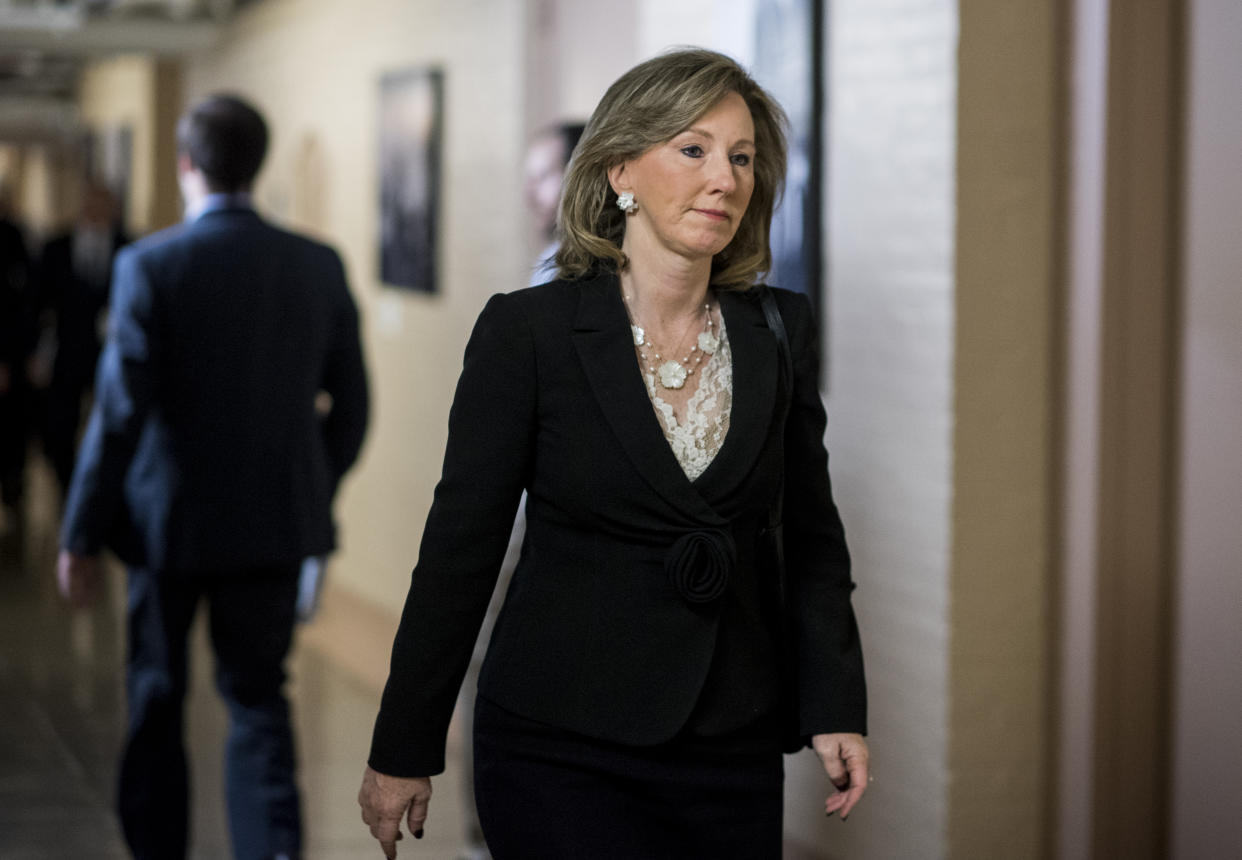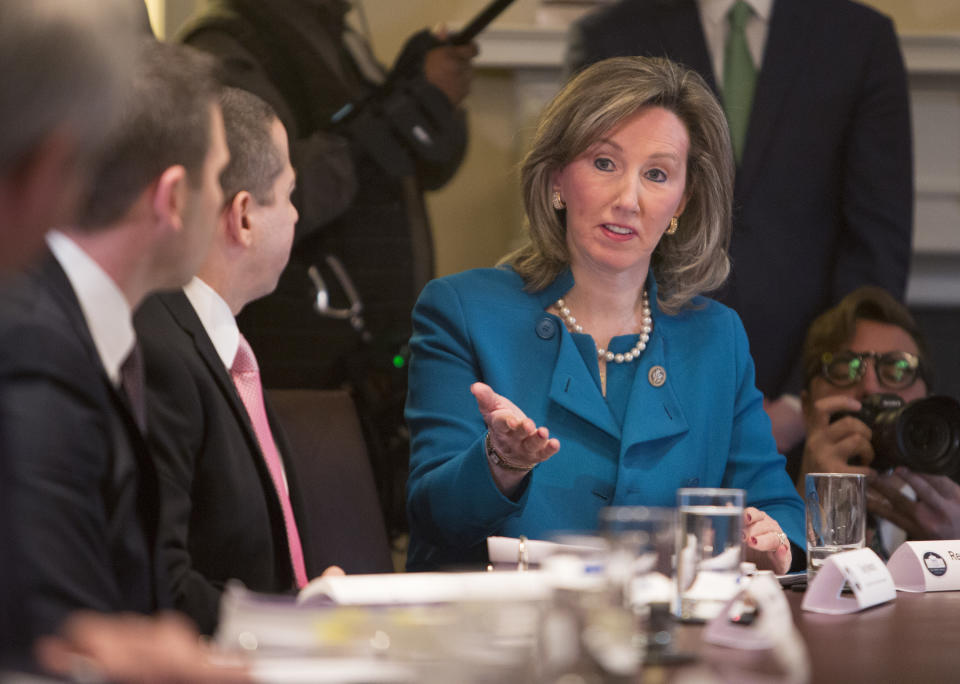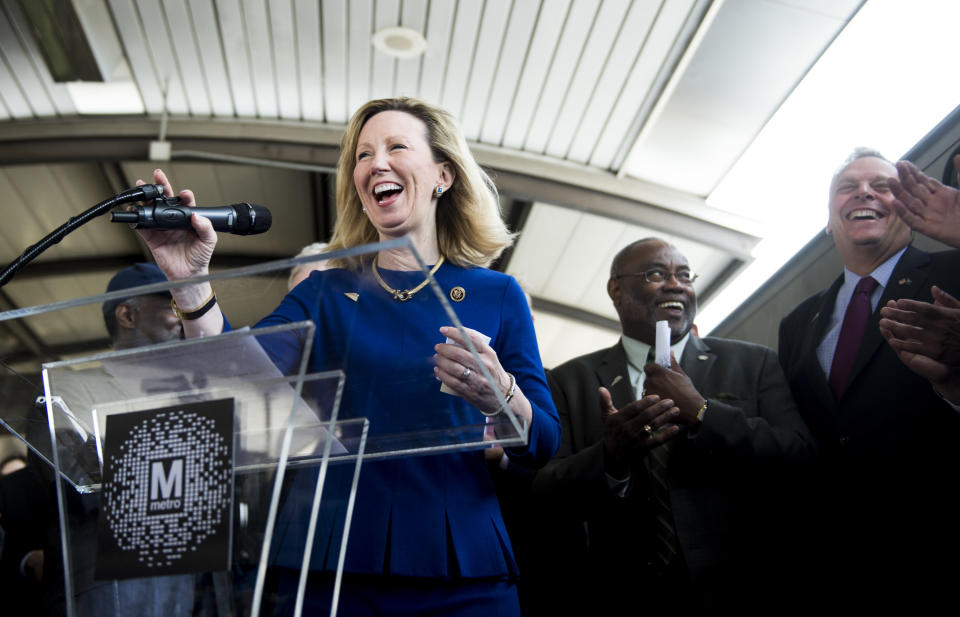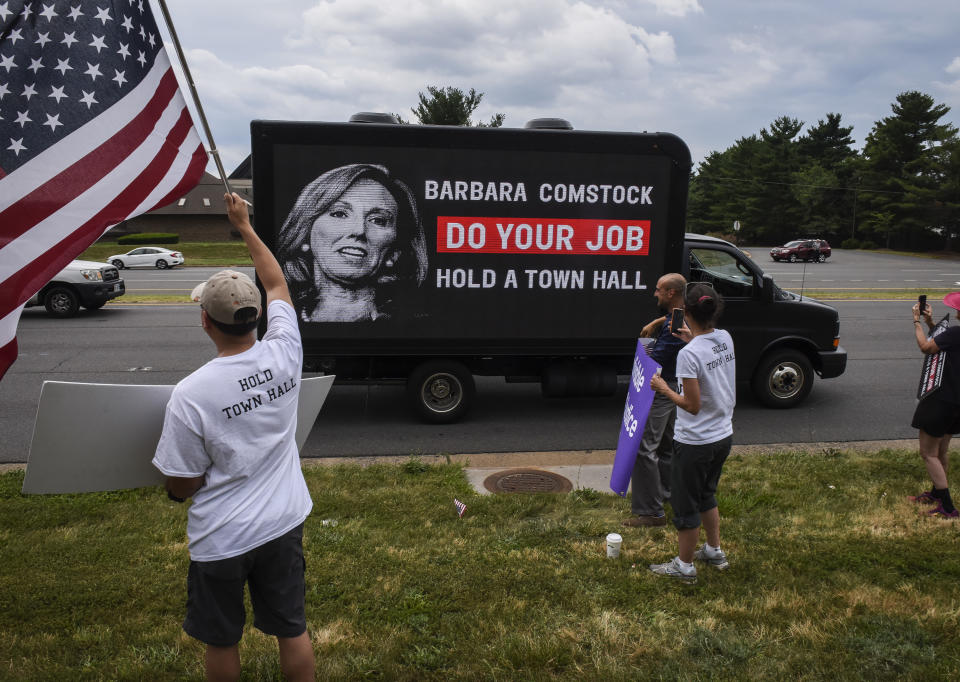A race to watch: In D.C. suburbs, a House Republican tries to tiptoe away from Trump

When Democrats settle in on Nov. 6 to see if they can win back control of the House, one of the first contests they’ll be watching will be just outside Washington, D.C., in the northern Virginia suburbs.
Republican Rep. Barbara Comstock’s seat in Virginia’s 10th Congressional District will be a crucial indicator. The result will be reported earlier than results from states farther west, and so both parties will use it as a weathervane. Democrats need to win 24 seats that are currently held by Republicans.
In a suburban district that is trending Democratic, Comstock has positioned herself as a moderate with a focus on local issues such as transit, while Democrats will try to tie her to President Trump. The same dynamic will be playing out in similar districts around the country, including three in Orange County, California; the Sixth District in Colorado, in suburban Denver; and the Seventh District in Texas, in and around Houston. All of these are suburban districts growing in population and ethnic diversity, giving Democrats a chance to win them.
Comstock faces a tough reelection fight. The 58-year-old Republican is considered one of the most vulnerable incumbents in the country. Gov. Ralph Northam, a Democrat, crushed Republican Ed Gillespie last fall and won Comstock’s 10th Congressional District by 13 points.

Democrats now say they have a 12-point party identification advantage among voters in Comstock’s district, and they recently released a polling memo showing that even if voters are asked about supporting Comstock or one of the six Democrats jockeying to oppose her, Comstock would lose by three points. Comstock ran about 12 points ahead of Trump in the 2016 election in her district, which Democrat Hillary Clinton won by 10 points.
Trump’s approval rating, around 40 percent, and his disapproval, in the low 50s, are both around the same that President Barack Obama had in the Gallup average during the 2014 midterm elections, when Republicans won a historic landslide of 64 seats and gained a sizable majority in the House, ushering in the tea party era.
In such an environment, it’s tempting for Democrats to focus only on national issues and on Trump. But that may not be enough for voters in Comstock’s district to send her packing.
Comstock, a veteran Republican operative who is renowned for her political smarts and her relentless work ethic, has made a point during her four years in Congress to focus on local issues like transportation. She spent most of 2017 working on legislation to reform the Metro train and bus system that serves the Washington region. She unveiled the legislation in December, though it has yet to emerge from committee in the House.
The former congressional staffer — who was an integral part of Republican-led investigations into President Bill Clinton in the ’90s — has also focused on public safety, sponsoring legislation to combat the MS-13 gang problem.

On another nationalized issue — women’s rights and the fight against sexual harassment and assault — Comstock has moved aggressively to implement reforms in Congress that have even angered some Republican lawmakers, according to one ally of hers.
“She has gained enemies in her own caucus, particularly Republican men who are worried about being outed for being louts, men who abused staff, pressured women, made unwanted advances,” said Mark Corallo, who worked with Comstock at the Justice Department under President George W. Bush. “She thinks we need to clean house.”
And she has always kept her distance from Trump. When the “Access Hollywood” tape went public in the fall of 2016, Comstock said Trump’s comments were “disgusting, vile, and disqualifying,” and called on him to drop out.
Democratic pollster Geoff Garin used Comstock as a contrast last year when talking about Gillespie’s campaign. “Comstock took pains to separate from Trump,” Garin said.
In early February, she delivered a very public rebuke to the president in front of the TV cameras. When Trump said he would “love to see a [government] shutdown,” Comstock disagreed. “We don’t need a government shutdown on this. I think both sides have learned that a government shutdown was bad,” she said.
But Democrats are determined to tie Comstock to Trump.
“Barbara Comstock’s days of trying to have it both ways are over. She tries to hide from Donald Trump when it’s convenient for her, but then votes with him most of the time,” Virginia Democratic Chairwoman Susan Swecker told Yahoo News.

As for Comstock’s transportation credentials, Democrats are going to hammer on her vote against Metro funding back in 2013 when she served in the state House of Delegates. Democrats made that an issue in Comstock’s first campaign for Congress in 2014, which she won anyway.
And for months, Democrats have been pressuring Comstock to hold town hall meetings, using the dearth of such events as evidence that Comstock is out of touch. Comstock supporters say no one works harder to be in the community and to respond to constituent concerns.
Comstock needs to retain the support of a conservative Republican base that dominates the western portion of the district, which stretches to the West Virginia state line. In fact, Gillespie lost this district in the primary to far-right candidate Corey Stewart. But the district is far more densely populated closer to D.C., in large part by federal workers.
“When you think of company towns, well, guess what the company is? It’s the federal government,” said Dan Scandling, a former top aide to Frank Wolf, who held Comstock’s seat for 34 years (Comstock worked for Wolf in the early ’90s).
And so Comstock’s confrontation with Trump over a government shutdown was an easy and significant win for her.
If the economy remains strong for the remainder of the year, that too may blunt Democratic attacks on Comstock voting with Trump, since the tax cut legislation was one of the biggest votes she’s taken.
Finally, Comstock has been a political knife fighter for over two decades now. Her time on the House Committee on Oversight and Government Reform during Clinton’s second term was formative. She was chief counsel for Rep. Dan Burton, an Indiana Republican who wielded the committee’s investigative powers against Clinton like a battering ram.

It was there that Comstock worked with David Bossie, whose antiestablishment and anti-Democrat fervor carried him to a top spot on Trump’s campaign in 2016. Another key Comstock colleague on the committee was Tim Griffin — now the lieutenant governor of Arkansas — who she recruited as her deputy on the 2000 presidential campaign to help her do opposition research at the Republican National Committee against Democratic nominee Al Gore.
“A campaign is a lot like a trial,” she told the Atlantic in 2004.
Her fundraising prowess is also first-rate. She had already raised $2 million by the end of 2017, after raising $5.3 million for her 2016 campaign. The only Democrat to even come close to that total so far is Alison Friedman, a human trafficking activist with State Department experience, who raised about $1 million in six months, though much of the money came from Hollywood celebrities.
Democrats privately acknowledge that Comstock is a formidable political opponent who cannot be underestimated.
“She has headwinds,” Scandling said, “but she has defied the odds in every election she has been in.”
_____
Read more from Yahoo News:


